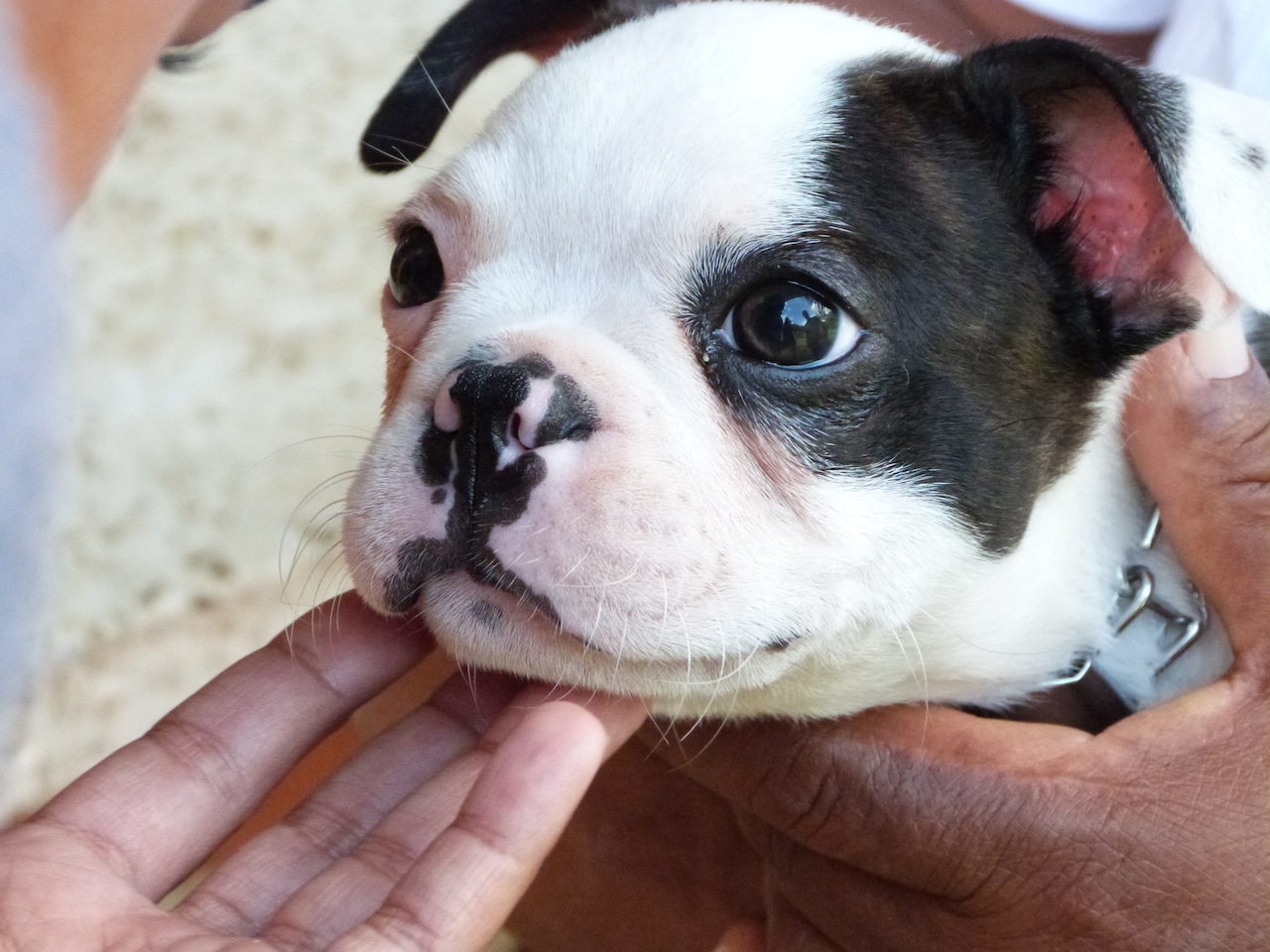
It’s been nearly 75 years since American songstress Patti Page captured the emotional pull of an adorable puppy for sale at a pet shop in the classic novelty song, “(How Much Is That) Doggie In The Window.”
While it may once have been commonplace for Massachusetts pet shops to offer their customers waggly-tailed pups for purchase, as of the beginning of 2025, the number of Bay State pet shops that sell dogs has dwindled to only six, according to the MSPCA.
For years, state legislators have sought, unsuccessfully, to bring that number to zero through a proposed state ban on the sale of dogs, cats and rabbits in pet shops. Legislators and animal welfare organizations claim that such a ban is necessary to stop pet shops from getting their supply of dogs from “puppy mills,” which they say breed dogs in inhumane conditions to keep costs low and product output high.
“We have never seen a large-scale, commercial breeder with enough staff to properly take care of hundreds of dogs and fully meet their physical, emotional and behavioral needs,” Amy Jesse and Kathleen Summers, both part of Humane World for Animals’ puppy mills public policy team, wrote in response to questions from MassLive.
Opposition to the sale of pets in pet shops has come from pet shops themselves and other industry stakeholders, who argue that large-scale breeders that supply pet shops with puppies have a moral, legal and financial incentive to treat their dogs well.
“We believe that if somebody is committed to raising dogs as their career, as their livelihood, that they’re going to have a vested interest in doing what’s best for those animals,” Mike Bober, the president of Pet Advocacy Network — a national pet shop industry group.
As the list of states that have enacted such bans has grown in recent years, Massachusetts legislators have felt increasing pressure to get one passed here. As a result, they are now pushing for a compromise bill that would only ban the sale of dogs, cats and rabbits in newly-established pet shops.
Despite hopes that such a bill would garner less pushback, pet shops and other industry stakeholders continue to do battle with animal welfare advocates and their allies in government over both the law and the reputation of pet shops and breeders.
What are ‘puppy mills’?
Humane World for Animals — formerly the Humane Society of the U.S. — defines “puppy mills” as “inhumane, high-volume dog breeding facilities that churn out puppies for profit, ignoring the needs of the pups and their mothers.”
Dogs raised by large-scale, commercial breeders are typically overbred, kept in unsanitary conditions, receive little personal attention or veterinary care and are offered few opportunities for exercise and enrichment, according to Humane World. These conditions allow puppies to be bred at high-volume for a low cost.
Furthermore, a single large-scale, commercial dog breeder may keep hundreds of reproducing females in cramped, stacked wire cages for their entire lives, according to Humane World. After the breeding dogs can no longer produce puppies, they are often killed or abandoned.
Because dogs from large-scale, commercial breeders are kept in such poor conditions, they often contract diseases, have serious genetic defects and develop behavioral issues, according to Humane World’s puppy mills public policy team. Dogs from “puppy mills” are commonly found to have heart murmurs or parasites and may exhibit aggressive behaviors, according to the non-profit.
Oftentimes, these issues do not become evident until after the dogs have left their place of birth, Humane World said. As a result, pet shops and consumers may encounter unexpected problems with dogs purchased from large-scale, commercial breeders that cost them thousands in veterinary or training services.
Why these problems persist
Humane World estimates that “puppy mills” sell around 2.6 million dogs each year. One reason inhumane breeding conditions continue to exist is because the federal animal welfare standards for breeders set forth the Animal Welfare Act of 1966 are outdated and insufficient, Humane World argues.
Oftentimes, pet shops that sell puppies assure customers that their dogs come from U.S. Department of Agriculture (USDA)-licensed breeders. But Humane World, the ASPCA and others argue that a USDA license is no guarantee of humane conditions, citing lax standards in the Animal Welfare Act.
Furthermore, industry stakeholders have also repeatedly lobbied Congress to keep federal animal welfare standards low, according to Humane World’s puppy mills public policy team.
Breeders often aren’t held to current federal standards, animal welfare organizations argue. Internal USDA reports have repeatedly found that the USDA has overall been ineffective at enforcing the Animal Welfare Act, according to a 2010 USDA report.
Questioning ‘puppy mills’
The American Kennel Club objects to the use of the term “puppy mills” altogether, Sheila Goffe, a vice president at the dog registry non-profit, said in an interview with MassLive. The organization believes it is an ill-defined, pejorative label that animal welfare advocates often apply too broadly.
“The concern we have is that we’ve heard them use this term interchangeably to reference professional breeders, and even hobby breeders. Just any breeder,” she said.
Goffe acknowledged that there are “bad actors” in the dog breeding industry, but said she doesn’t think many large-scale breeders prioritize profits over providing humane conditions for their animals.
Bober, whose organization opposes all bans on the sale of pets in pet shops, argued that most large-scale breeders view federal minimum animal welfare standards as a starting point for providing a healthy environment for their dogs — not a difficult-to-meet requirement.
In fact, dog breeders have a financial interest in providing conditions far better than those legally required of them, as their market is competitive, and poor conditions create poor quality dogs, Bober argued.
“The reality is breeders routinely exceed the minimum standards because they’re doing what’s best for the animals, and because they have a vested interest in seeing the animals that they offer up for sale be the best and most attractive they possibly can be,” he said.
Still, when asked whether he thought the Animal Welfare Act’s current minimum standards are sufficient to ensure the welfare of dogs, he said only that his organization supports the USDA utilizing the most up-to-date research to inform its standards.
Massachusetts pet shops and large-scale breeders
Massachusetts isn’t home to many large-scale breeders, though it’s not entirely clear why, according to MSPCA Advocacy Director Kara Holmquist. As such, Bay State pet shops typically import their supply of puppies from out-of-state breeders.
Though the state government keeps records of dogs imported into Massachusetts, it can still be difficult to track where the dogs were originally bred.
“Most of the pet shops now in Massachusetts use brokers to get their animals. So there’s a middleman, and it becomes more difficult for both us and for consumers to know where those puppies are coming from,” Holmquist said.
Even so, public records collected by Humane World show that at least two Massachusetts pet stores that sell dogs have purchased them from out-of-state breeders that have repeatedly violated the Animal Welfare Act in the past five years.
In 2020, The Perfect Puppy in Plainville imported puppies from an Iowa breeder who pleaded guilty to over 120 violations of the Animal Welfare Act in 2022. The federal government made the breeder surrender over 500 dogs while investigating him the year prior.
Additionally, public documents show that, as recently as 2023, The Fish Bowl in Fall River has imported puppies from several different breeders cited for Animal Welfare Act violations in the last five years, some of which have received many such citations over several years.
Owners of The Perfect Puppy and The Fish Bowl did not respond to repeated requests for comment on this article.
Of the six Massachusetts pet shops that still sell puppies, only Pet Express lists a “no puppy mill guarantee” on its website. Still, the website does not explain how it guarantees that its dogs do not come from puppy mills. Pet Express did not respond to multiple requests for comment on this article.
How Massachusetts’ puppy sale ban would work
State Rep. Natalie Higgins, D-4th Worcester, who is leading the effort to pass the House version of the compromise bill, emphasized that only new pet shops would be barred from selling dogs, cats and rabbits. New and old animal shelters, rescues and breeders would be unaffected.
Legislators and animal welfare organizations said they decided to pursue a compromise bill in the hopes that it might quell fears that the bill would hurt small, local businesses.
State Sen. Patrick O’Connor, R-1st Plymouth and Norfolk, is leading the effort to get the compromise bill passed in the Senate. He sees the bill’s grandfather clause for existing pet shops that sell pets as more than fair to local pet shops — even if they don’t.
“I don’t think that they would be happy with anything. They didn’t agree to this compromise. We’ve provided this compromise for them,” he said.
Do puppy sale bans work?
Bans on the sale of pets in pet shops are “well-intentioned, misguided and ultimately counterproductive,” Bober said.
Bober argued that the current USDA breeder and broker licensing system is “ the most transparent and most regulated way of sourcing of dogs out there.“ In fact, contrary to animal welfare organizations’ claims that large-scale breeders treat their dogs poorly, he asserts that pet shops buy from them because they are confident that these breeders treat their dogs well.
Banning pet shops from selling dogs and tightening federal animal welfare standards won’t get rid of inhumane dog breeding, Goffe of the American Kennel Club argued. The best solution, she said, is to step up USDA enforcement of the Animal Welfare Act.
“The worst thing in the world you can find is negligence or cruelty. And when you do see it, unfortunately it can tar everybody,” she said.
Why legislators think Massachusetts needs to act now
State Sen. O’Connor has been trying to get a ban on the sale of dogs, cats and rabbits in Massachusetts pet shops passed for about a decade now, he said. In that time, other states have successfully enacted such bans, leaving Massachusetts — a state that once lead the way on animal rights — struggling to catch up.
In fact, it’s nearby New York’s ban on the sale of dogs and cats in pet shops — which went into effect in December 2024 — that’s inspired a renewed sense of urgency to get the compromise bills passed, legislators and animal welfare advocates said.
“We just don’t want to see some of these operations moving over from New York State into Western Mass. looking for a place where they could still continue to operate,” Higgins said.
O’Connor believes his bills now have enough support in both houses of the Legislature to pass. The bills already have dozens of cosigners despite the fact that this legislative session has just begun. It’s just a matter of making their passage a priority for the Legislature, he said.
“We have every major statewide and even national animal rights and animal welfare organization on our side backing this up. We have a lot of constituents from throughout the state who are in support of this,” he said. “We feel very confident that we’ll get this done — it’s just a matter of when.”





